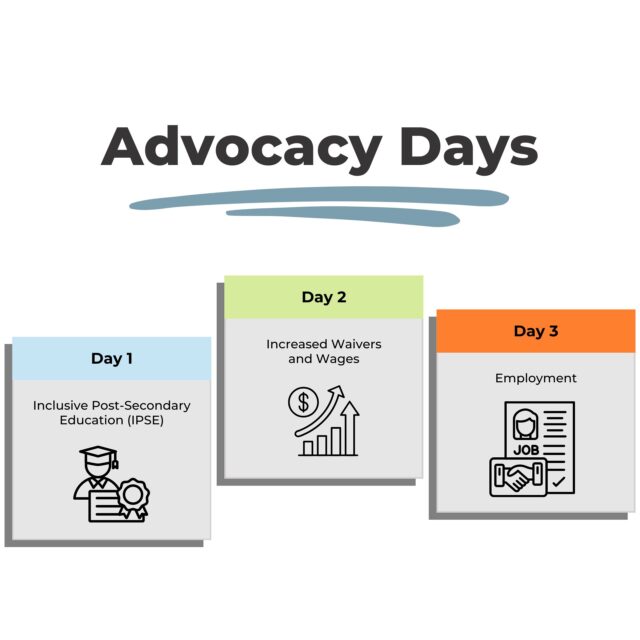
The Georgia Council on Developmental Disabilities’ (GCDD) public policy team has made tireless efforts to foster new relationships and educate legislators on the need for policy change that promotes opportunities for Georgians with developmental disabilities (DD) to live, learn, work, play, and worship in their communities – and it’s showing results.
This year, GCDD hosted three Advocacy Days. Advocacy Days encourage individuals from the intellectual (ID) or developmental disabilities (DD) community throughout Georgia to use their voices to advocate for their needs by coming to the state Capitol and speaking to their legislators directly. As a way to increase participation and to fully prepare advocates for their experience at the Capitol, each Advocacy Day during the 2024 session consisted of a virtual and an in-person day.
GCDD’s Legislative Advocacy Director, Charlie Miller, also piloted a partner event for Advocacy Days this year called “Navigate Before You Advocate.” This event allowed advocates to practice touring the Capitol and giving testimony before the legislative session started. While it was only open to a few participants this year, GCDD hopes to build on the success of “Navigate Before You Advocate” by making it more widely available before the 2025 session.
GCDD’s three Advocacy Days focused on inclusive post-secondary education (IPSE), waivers and wages, and employment.

Inclusive Post-Secondary Education (IPSE)
Our first Advocacy Day, which took place in January, centered on IPSE inclusive college programs that offer a variety of experiences and opportunities for growth as students with ID prepare for the next chapter of their lives. IPSE students participate in the same classes, clubs, residences, and athletics as students at nine (soon to be ten!) Georgia colleges and universities.
Yet tuition and program-specific costs remain challenging, as IPSE students do not qualify for HOPE scholarships. Last year, this challenge was addressed with the passage of HB 185. This bill, sponsored by Representative Houston Gaines, created IPSE grants that cover standard tuition and fees for students in these programs. However, the legislature only provided enough funding to cover the standard tuition for these programs, leaving many students to cover the disproportionately high cost of program fees (which vary widely depending on the IPSE program).
Our main advocacy goal for IPSE Advocacy Day, therefore, was for an additional $1,644,170 in the Georgia Student Finance Commission’s Budget for IPSE Grants to fund tuition fully and required IPSE program fees for students. To achieve this goal, GCDD advocated for $2.6 million in total IPSE grants.
Results: The IPSE Advocacy Day had dozens of attendees from seven schools. The legislature included the entire requested amount in their final budget. This means that this fall, IPSE students will be able to apply for grants that cover the full cost of their tuition and program fees, making an inclusive collegiate experience accessible for more Georgians with ID.
Increased Waivers and Wages
On the second Advocacy Day, which was in February, GCDD focused on increasing home and community-based services (HCBS) waivers and direct support professional (DSP) wages. In Georgia, there are two HCBS waivers: NOW (New Option Waiver) and COMP (Comprehensive Support Waiver). These waivers provide support for Georgians with DD to live and work in their communities. Historically, there has been underinvestment in these programs, leading to a waitlist of over 7,300 individuals who need and qualify for these services.
Additionally, DSPs who provide crucial day-to-day support for Georgians with DD have long been underpaid. This has led to increased turnover rates and workforce shortages, with many providers unable to meet the high demand for support professionals. Fortunately, the Department of Behavioral Health and Developmental Disabilities (DBHDD) completed a comprehensive rate study last year, increasing the average pay rate for DSPs from roughly $10.00 per hour to roughly $16.00 per hour. To make this pay increase a reality, the legislature must fund the rate study by including $107 million in the state budget.
Georgians with DD need NOW/COMP waivers to live autonomous lives, and the DSPs who aid them need livable wages. Therefore, during GCDD’s Waivers and Wages Advocacy Day, participants advocated for:
- Funding 2,400 additional NOW/COMP waivers for a total cost of $65 million in FY 2025 budget (2,400 is the number of waivers suggested by a Senate Study Committee in 2022).
- Support the Governor’s and DBHDD’s commitment to fully funding the rate study ($79 million from the Governor’s Budget, $28 million from DBHDD for a total of $107 million).
- Create an innovation commission for people with intellectual and developmental disabilities (I/DD) to further study how Georgia can best invest in its I/DD community.
Results: Unfortunately, the legislature only allocated enough funding for 100 new waivers in the FY25 budget. This means the waitlist will remain above 7,000 individuals for at least the next year. Fortunately, however, the legislature fully funded the rate study, this means that DBHDD will be able to propose these new rates to the Center for Medicare and Medicaid Services (CMS) and the Department of Community Health (DCH) for approval, and, once approved, DSPs will see a pay increase. The proposal to create an I/DD Innovation Commission received pushback in the House, with legislators contending that the work appeared redundant. Unfortunately, the House tabled.
Employment
GCDD’s final Advocacy Day, which took place in March, centered on employment, more specifically, advocating for Georgia as a Model Employer (GAME) and ending subminimum wage for people with DD. This year, two exciting pieces of legislation were introduced to achieve these goals. Senate Bill384, sponsored by Senator Billy Hickman (R – District 4), would create the GAME program, to encourage the recruitment, hiring, and retention of employees with disabilities at state agencies. HB 1125, sponsored by Representative Sharon Cooper (R – District 45), would phase out the use of subminimum wages for workers with DD. Georgia’s disability community is an underutilized talent pool and Georgians with DD want real jobs and deserve real wages.
Results: SB 384 was passed with approved amendments, while the senate read HB 1125 a second time.
My Experience as GCDD’s Public Policy and Advocacy Fellow: This experience has come full circle for me. I’m from Georgia, grew up in Georgia. And after taking classes in state politics and doing mock legislatures, I get to take part in actual disability policy in the state. Every day is different and exciting. I get to work with people just as dedicated as I am to disability rights.
Other Important Legislation Observed During Session
Along with the Advocacy Days and the bills we advocated for our representatives to support, here are some additional pieces of legislation that we observed during the session:
- HB 1078, Department of Community Health, Georgia Program of All-Inclusive Care for the Elderly (PACE). This gives permission to the Department of Community Health to create and implement a program to manage state-funded, all-inclusive care for the elderly. This bill was passed and adopted in the Senate.
- SB 198, Georgians with Intellectual and Developmental Disabilities Innovation Commission, would establish a Georgians with Intellectual and Developmental Disabilities Innovation Commission to enable long-term planning of services for the disabled community. This legislation, however, was tabled in the House.
My Experience as GCDD’s Public Policy and Advocacy Fellow: I loved it! Meeting individual advocates and family advocates statewide. Seeing state policy enacted in real time. Lamenting the lack of coffee and vending machines in the Coverdell Legislative Office Building. This was a dream for me since trying a mock state legislature in college. People are nice in the capitol, legislators and state employees alike.
Moving Forward
We at GCDD are generally elated with this session’s strides toward inclusion and equity for those in the DD community. Due to the hard work and dedication of the GCDD public policy team, the representatives who supported our causes, the advocates who gave their all during our advocacy days, and many others, we made significant progress during this session.
With that said, there are still more issues that need to be advocated for, and problems that need legislative solutions. To ensure we keep with this momentum, here are some steps we all can take to continue our advocacy during the legislative off-season:
- Attend state agency board meetings to learn how to be involved all year.
- Stay connected with your representatives (find your representative here) and the Governor’s office via email or phone and continue to inform them about important issues that impact the ID and DD community.
- Lastly, make sure you stay connected with us at GCDD through our website, email, and all of our social media platforms to learn of additional off-season advocacy opportunities.
Until the next session, we applaud you for continuing to create and share space for education, advocacy and connection. Our teamwork and love for this community gives us the momentum and strength to keep moving forward. Together we have made some amazing progress, but many obstacles remain to overcome. Thanks to your hard work, sacrifices of time, and effective advocacy, we can and will influence more positive change with, and on behalf of Georgia’s ID and DD community.
